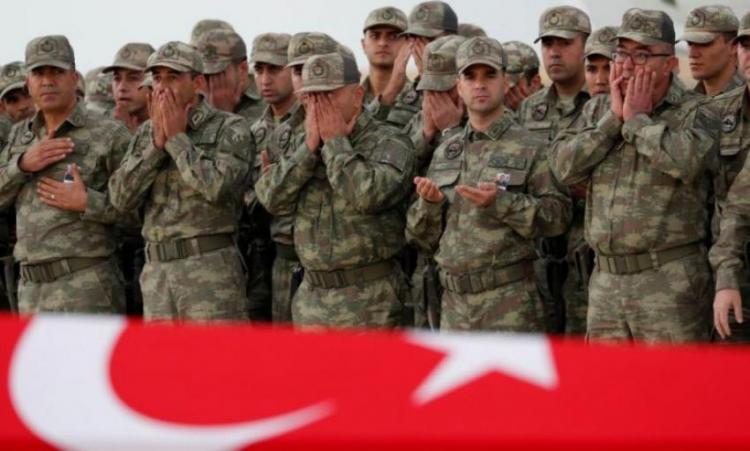Politician: Despite denials, Turkey’s losses are very high
North-Press Agency
Egyptian politician Mahmoud Abu Hosh said that Turkey and its affiliated armed groups are suffering huge losses in Libya, in addition to what is being circulated regarding the arrest of Syrian fighters who were sent from Turkey to fight in Libya.
In conjunction with its losses, Turkey expresses its anger and annoyance at the European naval operation IRINI, which was launched to monitor the prevention of arms shipments to Libya, considering it illegal and not coordinated with what it described as the “legitimate government”, referring to the government of Fayez al-Sarraj.
Denunciation and denial
Abu Hosh told North-Press that as the Libyan National Army (LNA) continues to advance against the militias of the Government of National Accord and the militias hired by Turkey and sent to Libya to impose a fait accompli of Turkish-backed terrorism in Libya, these militias fall day after day with this advance while Turkey faces the Government of National Accord (GNA) with condemnation and denial for this advance so that it does not show its failure and withdraw its militias.
Colonel Mohamed Faraj Othman at the Media Center of the LNA's Dignity Operations Room said that the LNA targeted GNA-allied sites in al-Naser Forest in Tripoli with artillery, and their artillery forces targeted a drone site at the Maitika military base.
Abu Hosh said that the aforementioned is evidence of the fact that the latest Turkish statements were not intended to clarify the losses incurred among their militia.
He pointed out that the deepening of the Turkish presence in the Libyan scene has led to great losses, and this is evident in the advance of the LNA and the retreat of the militias backed by millions of dollars from Turkey. It is natural that this support will be reflected in the situation of the Turkish economy and the recent decline in the Turkish lira.
He added that the implications of the coronavirus pandemic's economic repercussions at this time, which was evident from the unprecedented decline in the Turkish economy, makes us expect Turkey to ease its support as a result of current international circumstances. If this will not last long, Turkey will return to increasing support for its presence in the Libyan scene more intensely than before.
IRINI Operation
Recently, Turkish Defense Minister Hulusi Akar expressed his indignation with the European naval operation IRINI, in which France, Italy, and Greece, as well as other countries are participating to monitor the supply of weapons to Libya, consider this operation as supporting the forces of Khalifa Haftar at the expense of the forces of Fayez al-Sarraj.
Abu Hosh said that against the background of Turkish officials denying any deaths or injuries among their forces in Libya, and their condemnation of the launch of the IRINI Operation by European countries in which it sees the support of the commander of the Libyan National Army Khalifa Haftar. "In fact, this behavior is not new in Turkish foreign policy, since Turkey has turned its attention towards Libya, especially after the al-Sarraj and Erdogan agreements which issued statements justifying the legitimacy of its presence in Libya as a historical legacy," Abu Hosh said.
Regarding the naval operation, Hulusi Akar said, "What is being done in this region is to monitor or prevent maritime entry and exit operations. It is not considered an arms ban, but rather banning the activities of the legitimate government, because the legitimate government does not have such a request." At the same time, he asked whether coordination had been done with NATO in this regard.
"Turkey condemns the existence of this operation because it will monitor the implementation of the Security Council resolution on the export of arms to Libya, and it will monitor Turkish violations of this resolution, and hence Turkish fears of this operation which will be the revealer of Turkish behavior," Abu Hosh said.
He continued that the Minister of Defense’s statements about the possibility of this operation being coordinated with NATO and other countries in the region, and his response, that is – did the people in charge of this operation coordinate with NATO and other countries in the region? – and his response to the existence of inter-differences, so Turkey plays on the chord of exploiting the inter-differences and the lack of clarity of a unified stance among European countries towards the Libyan case in order to deepen its political, economic, and military presence.
He stressed that the Turkish stance comes in the context of the continuation of the policy of secrecy on Turkish losses, which was largely demonstrated by the campaigns of the Turkish regime against journalists who tried to expose those losses in Libya, as well as the arrest of the news director of the channel Oda TV, Parish Turkoglu, against the backdrop of a report published by the channel addressing the funeral of a member of the Turkish intelligence service who was killed in the Libyan capital Tripoli.
On March 31st, the European Union announced the launch of the IRINI operation in the Mediterranean to monitor the arms embargo to Libya with the participation of three ships contributed by France, Greece, and Italy. This was rejected by the Turkish-backed GNA, which insisted that the Turkish armed forces would continue to do what they had to do in Libya in support of legitimacy, and that their presence in Libya met the call of the UN-recognized government, according to its allegations.

